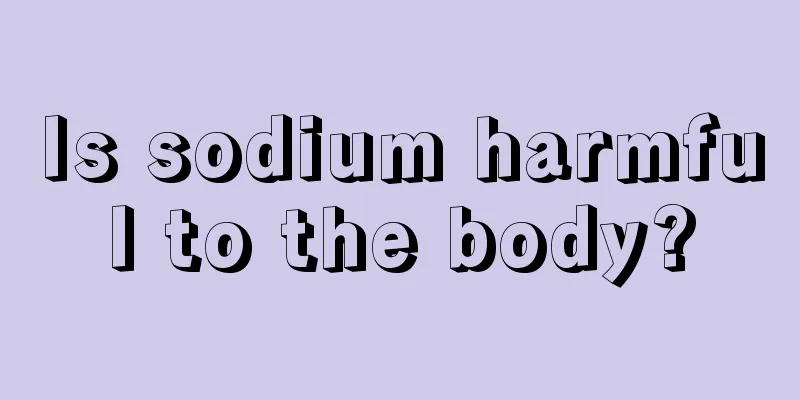Is sodium harmful to the body?

|
Sodium is one of the trace elements that our human body needs every day, and our body's demand for sodium is mainly met through table salt. Everyone should know that the main component of table salt is sodium. Taking in a certain amount of table salt every day is the basic guarantee for maintaining our body's metabolic balance. Since sodium plays such an important role in our human body, what harm does it do to our body? Let’s find out together! Excessive sodium can cause local sodium hypernatremia, which has a significant impact on the central nervous system. The patient becomes easily agitated, restless, drowsy, has increased muscle tone, convulsions, seizures, and even coma. The constant amount of water in the body is mainly regulated by sodium. More sodium means more water, and less sodium means less water. Therefore, if you consume too much salt, edema is likely to occur, while too little salt can easily cause dehydration. Sodium intake is mainly through food, especially salt. Almost all of the sodium consumed daily by the human body is absorbed from the gastrointestinal tract and transported to the kidneys through the blood. The main routes of sodium excretion are through the kidneys, skin and digestive tract. Normally the kidneys are the major organ for excretion of sodium. The kidneys regulate the amount of sodium excreted in the urine based on the body's sodium levels. The skin excretes sodium mainly through sweat. Under special circumstances, such as heavy sweating, the amount of sodium excreted through the skin increases greatly. A small amount is also excreted with feces. The amount of sodium excreted is related to the amount of sodium intake by the body. The less you intake, the less you excrete. However, when there is no sodium intake, the body can still excrete a small amount of sodium. Therefore, a long-term salt-free diet will lead to a lack of sodium in the body and abnormal sodium metabolism. The above content introduces in great detail the harm that excessive sodium can cause to our body. Friends who have read it must have already understood this issue. Too much sodium will put a great burden on our kidneys. In severe cases, it will cause kidney dysfunction and easily cause edema. However, if we lack sodium, we will become dehydrated. |
<<: What is chronic vulvar dystrophy
>>: Is molybdenum harmful to the body?
Recommend
What is the reason why oral ulcers do not heal for a long time? These factors should be taken seriously
Many people suffer from recurrent oral ulcers whi...
Don't rub these areas hard when taking a bath
Taking a bath is something that everyone must do,...
Can lack of sleep also cause liver cancer? 8 bad habits are most likely to induce liver cancer
Liver cancer is one of the most common malignant ...
Is digestive ulcer disease serious?
Gastrointestinal ulcers are actually a serious di...
Postoperative care for colon cancer
What are the postoperative care measures for colo...
Why are my calves swollen in the afternoon?
If your calves become swollen in the afternoon, i...
Tips on how to clean yellow milk stains
Most families with babies wash their babies’ clot...
What are the clinical manifestations of laryngeal tumors?
Smoking, drinking, air pollution, viral infection...
10 early symptoms of pancreatic cancer
Pancreatic cancer is a highly lethal malignant tu...
Diet therapy for breast cancer with the effect of promoting blood circulation and reducing swelling
Breast cancer patients may experience symptoms su...
What causes mouth ulcers? How to treat it?
Oral ulcers are a common oral disease in clinical...
What to eat for ovarian tumors? Five types of food suitable for patients with ovarian tumors
The incidence of ovarian cancer has been relative...
What are the early symptoms of small cell lung cancer
Small cell lung cancer often occurs in smokers, a...
The incidence of endometrial cancer in women is nearly 200,000, and the cause is related to 8 major factors
Endometrial cancer, as the name implies, refers t...
Diet therapy that can relieve cancer pain in patients with colorectal cancer
The high incidence of colorectal cancer has becom...









